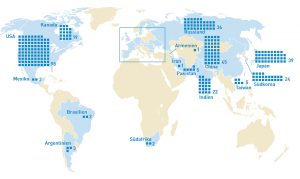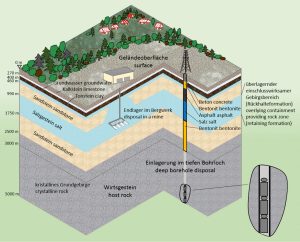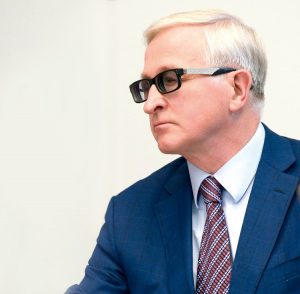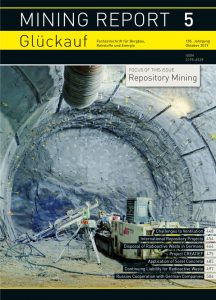In 2011 the German Government decided that it would completely phase out nuclear energy use by the end of 2022. Other countries, however, continue to use nuclear power and are even busy building new nuclear power stations. The question of what is to be done with the radioactive waste has only been partly resolved. While a number of countries around the world have found and implemented disposal and permanent storage solutions for dealing with low and intermediate-level radioactive waste, there are currently no permanent repositories in operation for the containment of high-level waste from the nuclear industry.
Under the heading “repository mining” the current edition of Mining Report Glückauf therefore presents a review of the long-term waste management projects …Read more
With my best regards // Mit freundlichem Glückauf
Dipl.-Ing. Andreas-Peter Sitte
Chief Editor Mining Report Glückauf, Essen
Comparative Survey of International Repository Projects

Fig. 1. Nuclear power plants in operation worldwide excl. West/Central Europe (1). // Bild 1. Kernkraftwerke in Betrieb/weltweit ohne West-/Zentraleuropa (1).
Author: Dr.-Ing. Frank Charlier, Nukleare Entsorgung und Techniktransfer (NET), RWTH Aachen University, Aachen/Germany
Read moreDisposal of Radioactive Waste in Germany – An Overview of Ongoing Projects
In the field of radioactive waste disposal, a particularly wide range of mining activities has to be carried out using state-of-the-art technology and high safety standards. This is especially true when a broad range of objectives is persued under different site conditions, as is the case in Germany. If the focus is on waste with negligible heat generation, the Konrad project is an example of the conversion of a mine into a repository, which requires extensive reconstruction, expansion, conversion, and complex securing of shafts and drifts. The Morsleben repository, on the other hand, is currently being kept open and work on decommissioning the repository is progressing vigorously. A focal point is the design of the sealing structures. They, as well as backfilling measures for stabilisation, are indispensible for the long-term isolation …Author: Dr.-Ing. Hans-Joachim Engelhardt, BGE TECHNOLOGY GmbH, Peine/Germany
Read moreDeep Borehole Disposal of High-Level Radioactive Waste – Results of the Project CREATIEF

Fig. 1. Schematic deep borehole disposal in crystalline rock. // Bild 1. Schema zur tiefen Bohrlochlagerung im Kristallin.
Authors: Dr.-Ing. Tino Rosenzweig, TU Bergakademie Freiberg, Freiberg/Germany, Dipl.-Ing. Wilhelm Bollingerfehr, BGE TECHNOLOGY GmbH, Peine/Germany, Dr.-Ing. Christin Dieterichs, TU Bergakademie Freiberg, Freiberg/Germany, Dipl.-Ing. Maxi Herold, Bundesgesellschaft für Endlagerung (BGE), Peine/Germany, Prof. Dr.-Ing. Wolfram Kudla, TU Bergakademie Freiberg, Freiberg/Germany und Prof. Dr.-Ing. Matthias Reich, TU Bergakademie Freiberg, Freiberg/Germany
Read moreApplication of Sorel Concrete for Barrier Construction and Cavity Stabilisation at Schachtanlage Asse II

Fig. 1. Basic concept for a horizontal flow barrier at Schachtanlage Asse II. // Bild 1. Grundkonzept einer horizontalen Strömungsbarriere in der Schachtanlage Asse II. Source/Quelle: BGE
Authors: Dipl.-Ing. Jens Köhler, Dipl.-Ing. Lutz Teichmann, Dipl.-Ing. Matthias Heydorn, Dipl.-Geow. Dr. Paul Eric Wolff, Bundesgesellschaft für Endlagerung mbH, Schachtanlage Asse II, Remlingen/Germany
Read moreContinuing Liability and Distribution of Responsibility for Radioactive Waste – and after Coal Phase-Out
Final disposal site mining is mainly characterised by the transfer of the responsibility for the disposal to the Disposal Fund. But apart from that, the energy companies remain responsible – without any option of being released from liability. This continuing responsibility is laid down in the German Continuing Liability Act (Nachhaftungsgesetz). Is there also a continuing liability for the mining industry in light of the coal phase-out?Author: Univ.-Prof. Dr. jur. Walter Frenz, RWTH Aachen University, Aachen/Germany
Read more“Russia is interested in Cooperation with German Companies”

Fig. 1. Alexander Shokhin, President of the RSPP. // Bild 1. Alexander Schochin, Präsident des RSPP. Photo/Foto: www.kremlin.ru
Author: Deutsch-Russisches Rohstoff-Forum e.V. (DRRF), Freiberg
Read more




















